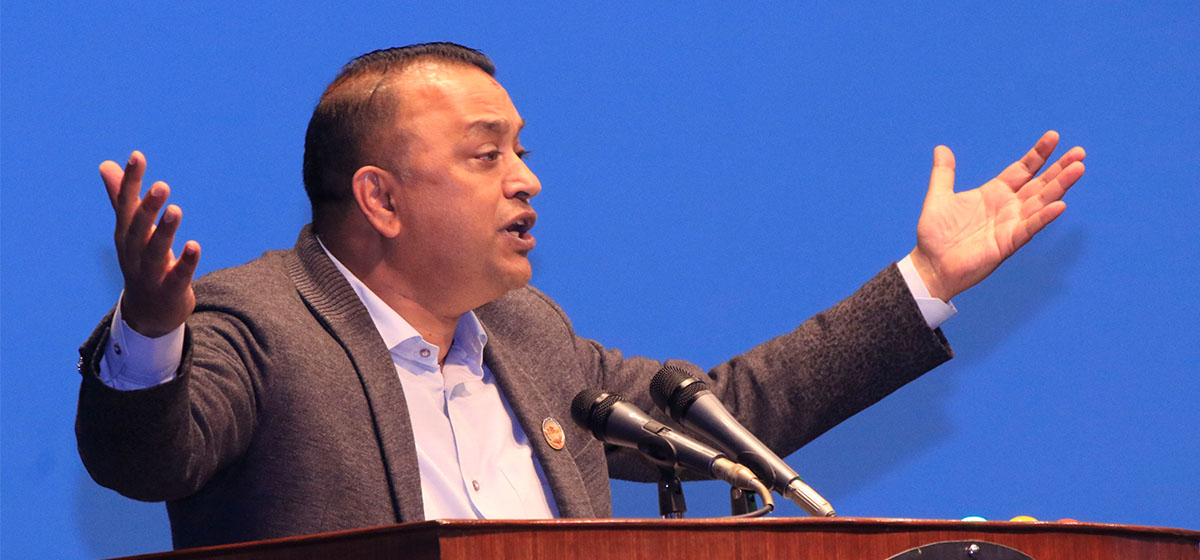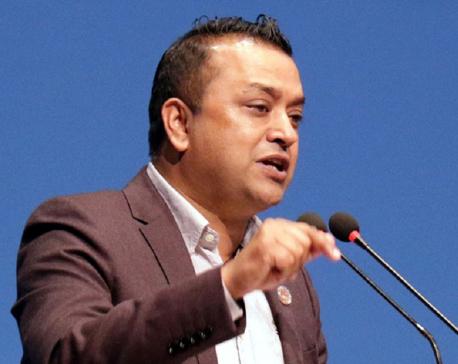
OR
Gagan Thapa demands declaration of ‘National Production Decade’
Published On: May 22, 2022 03:47 PM NPT By: Republica | @RepublicaNepal

KATHMANDU, May 22: Member of Parliament and General Secretary of the Nepali Congress, Gagan Kumar Thapa has demanded the declaration of the ‘National Production Decade’ to increase domestic production and minimize trade deficit.
Thapa, speaking before the House of Representation on Friday, voiced his opinion that 2022-2033 should be declared the ‘National Production Decade’. He claimed to have already shared thoughts about this with Prime Minister Sher Bahadur Deuba.
Thapa views that since the country’s economy is not sound, the trade deficit should be reduced by increasing domestic production. Thapa is of the opinion that essential infrastructures should be supported to increase national production. “Competitiveness should be increased by bringing in technology,” said Thapa. “For this both hard and soft policies are necessary.”
He advocated programs such as ‘Make in Nepal’ and ‘Made in Nepal’. Expressing his concerns about the country’s economic state, he said that the budget for the upcoming fiscal year could still be revised. He articulated the necessity of a budget that gave more importance to long-term programs rather than constituency-focused programs.
He lamented that Nepal has become a country that sold people and bought goods. He mentioned how as an agricultural country kitchens in Nepali households have more imported goods and fewer products from the country’s own farms.
To increase production and create employment in the country, he voiced the need for plans to operate state-owned industries. Thapa perceives that the government must employ policies that help conserve industries in the country. He regards that certain goods such as thread, cloth, footwear, construction materials, food grains, forest products, medicinal herbs, medicines, and handicrafts should be prioritized.
He believes that efforts to increase foreign and domestic investment, train manpower, and support small and medium industries must be made. “To increase production and encourage export, customs exemption for a fixed period is needed,” said Thapa. “Industries must increase their competitiveness within 10 years. We can advance by announcing now itself that the government would not provide any tax cuts after that.”
Thapa feels that there are prospects for production to increase if the government facilitates the shoes and textile industry. Currently, the Nepali people consume around 90 million pairs of shoes every year; however, 50 million pairs of shoes are imported. “There is a possibility of Nepal manufacturing 45 million more pairs of shoes,” said Thapa.
Thapa mentioned that the Nepali population consume about 60 million meters of clothes every year where, according to records, 10 % of the clothes are domestically manufactured while 10% are imported by paying customs duties. He said that records of 80% of clothes are missing. “Either they (the clothes) come undervalued or come by theft,” speculated Thapa. He believes that the domestic industries would flourish if the government becomes strict. He requested the finance minister to focus more on the development of industries instead of the collection of revenue.
You May Like This

Oli has held parliament hostage: NC General Secretary Thapa
GORKHA, Jan 8: Nepali Congress (NC) General Secretary Gagan Thapa has accused UML Chairman KP Sharma Oli of holding the... Read More...

NC Lawmaker Thapa advises PM Oli to take rest
KATHMANDU, Sept 4: A lawmaker from the main opposition Nepali Congress Gagan Thapa has urged Prime Minister KP Sharma Oli... Read More...

Bill to enable PM alone to recommend army mobilization
KATHMANDU, March 16: The government has registered a Security Council Bill at parliament, proposing special powers to the prime minister... Read More...










Just In
- Heavy rainfall likely in Bagmati and Sudurpaschim provinces
- Bangladesh protest leaders taken from hospital by police
- Challenges Confronting the New Coalition
- NRB introduces cautiously flexible measures to address ongoing slowdown in various economic sectors
- Forced Covid-19 cremations: is it too late for redemption?
- NRB to provide collateral-free loans to foreign employment seekers
- NEB to publish Grade 12 results next week
- Body handover begins; Relatives remain dissatisfied with insurance, compensation amount







Leave A Comment